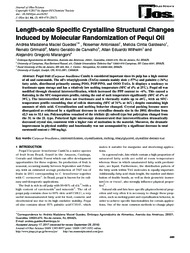Length-scale specific crystalline structural changes induced by molecular randomization of pequi oil.
Length-scale specific crystalline structural changes induced by molecular randomization of pequi oil.
Author(s): GUEDES, A. M. M.; ANTONIASSI, R.; GALDEANO, M. C.; GRIMALDI, R.; CARVALHO, M. G. de; WILHELM, A. E.; MARANGONI, A. G.
Summary: Pequi fruit (Caryocar brasiliense Camb) is considered important since its pulp has a high content of oil and carotenoids. The oil?s triacylglycerols (TAGs) contain mainly oleic (~57%) and palmitic (~36%) fatty acids, distributed primarily among POO, POP/PPO, and OOO TAGs. It displays a tendency to fractionate upon storage and has a relatively low melting temperature (SFC of 4% at 25?). Pequi oil was modified through chemical interesterification, which increased the PPP content to ~6%. This caused a flattening in the SFC-temperature profile, raising the end of melt temperature significantly (SFC of 4% at 39?). The interesterified oil does not fractionate and is thermally stable up to 40?, with an SFCtemperature profile resembling that of roll-in shortening (SFC of 31% at 16?) despite containing high amounts of oleic acid. Crystallization and melting behavior changed. Crystal packing became more disorganized as evidenced by a significant decrease in crystalline domain size in the [001] direction from 42.3 nm to 32.1 nm. Polymorphism remained of the triclinic (?) subcell type but polytypism changed from the 3L to the 2L type. Polarized light microscopy demonstrated that interesterification dramatically decreased crystal size, consistent with a higher rate of nucleation in the material. Moreover, the dramatic improvement in physical stability and functionality was not accompanied by a significant decrease in total carotenoid content (~390 mg/kg).
Publication year: 2017
Types of publication: Journal article
Unit: Embrapa Food Technology
Observation
Some of Embrapa's publications are published as ePub files. To read them, use or download one of the following free software options to your computer or mobile device. Android: Google Play Books; IOS: iBooks; Windows and Linux: Calibre.
Access other publications
Access the Agricultural Research Database (BDPA) to consult Embrapa's full library collection and records.
Visit Embrapa Bookstore to purchase books and other publications sold by Embrapa.

